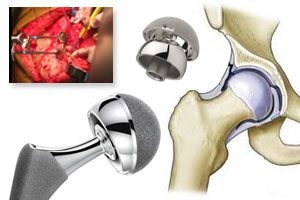
Hip Implant Revision Surgery. In the U.S., roughly 40,000 patients have revision surgery every year, according to the American Academy of Orthopaedic Surgeons (AAOS). Revision surgery is a complicated but necessary procedure required when a hip implant fails, according to the AAOS. The patient may experience severe side effects for months prior to hip […]

Hip Implant Revision Surgery. In the U.S., roughly 40,000 patients have revision surgery every year, according to the American Academy of Orthopaedic Surgeons (AAOS).
Revision surgery is a complicated but necessary procedure required when a hip implant fails, according to the AAOS. The patient may experience severe side effects for months prior to hip revision surgery.
Once a doctor makes an assessment regarding whether there is a need for hip revision surgery – basically a procedure to correct the problem of a defective hip implant – it is up to the patient to determine the next step; if they want an opportunity to be able to walk again, pain-free, they will opt for revision surgery, as there is really no other viable solution to the problem.
Complications that can make a doctor conclude that there is a need for revision surgery include (these include injuries specific to metal-on-metal (MoM) implants):
Relief from pain is a major benefit of hip revision surgery, according to the Cleveland Clinic.
Many patients find that the procedure also improves their mobility, strength and coordination, in addition to improving the very outward appearance of their hip and leg. Revision surgery can enable patients to return to normal activity with a pain-free hip.
Successful hip revision surgery, however, is not a given. There are dangers, as noted, including the potential for some adverse events specific to MoM implants.
Hip revision surgeries are complicated, especially in the case of MoM hip implants. Consider: the initial hip replacement surgery is itself a complex process that involves sizing and fitting to a patient’s hip joint an implant – usually one with a ball-and-cup configuration, as that was the design of many popular metal-on-metal implants, according to Canale & Beaty’s Operative Orthopaedics.
When the doctor begins revision surgery, they must first remove the original hip implant – which is buried inside the patient’s leg. The surgeon does so by first dislocating the patient’s hip.
Then, the surgeon removes the defective hip implant and while carefully manipulating the femur inserts the new replacement implant into the patient’s leg, which has already been damaged, first by the problem that required the initial implant, then the procedure to install the initial implant, then by the defective implant itself, and yet again in the process of removing the defective implant.
An entire revision surgery can last for about five hours, a duration that heightens the chances for another problem to develop: an infection.
Other dangers commonly associated with hip revision surgery in general include fracture of the hip or related bones. Also, afterward, the patient may find themselves in less pain than they were in prior to revision surgery, but still in pain, nevertheless.
Also weakness, stiffness and/or instability of the hip joint are also possible results of revision surgery. The bottom line is that revision surgery may only be the beginning of the need for one or more additional follow-up surgeries.
Also, as with all surgeries, there is always the chance of unexpected complications developing. For example, problems can arise from the use of anesthesia, which can cause respiratory or cardiac malfunction. In addition, there is also the chance of injury to nerves and blood vessels, according to the Cleveland Clinic.
After surgery, medicines or therapy may be prescribed primarily to prevent blood clots, the Cleveland Clinic noted. To decrease your chances of having a Deep Vein Thrombosis (DVT) after surgery, you may be given medication, have to wear special stockings and do some exercise for your ankles.
You also may be given patient-controlled analgesia (PCA) which allows you to control your own pain medication through an IV; it usually lasts for one or two days following the procedure.
You may have an appointment after surgery depending on the wound closure method preferred by your surgeon.
Also, you should call your surgeon before this appointment if you experience any of the following symptoms:
If you or a loved one are among the thousands whose health has been put in jeopardy by a defective metal hip implant, and/or needed to undergo revision surgery, you may be entitled to compensation for your medical bills, lost wages, and pain and suffering. To discuss your case with one of our metal hip implant lawyers, fill out our online form or call 1-800-YOURLAWYER (1-800-968-7529).


